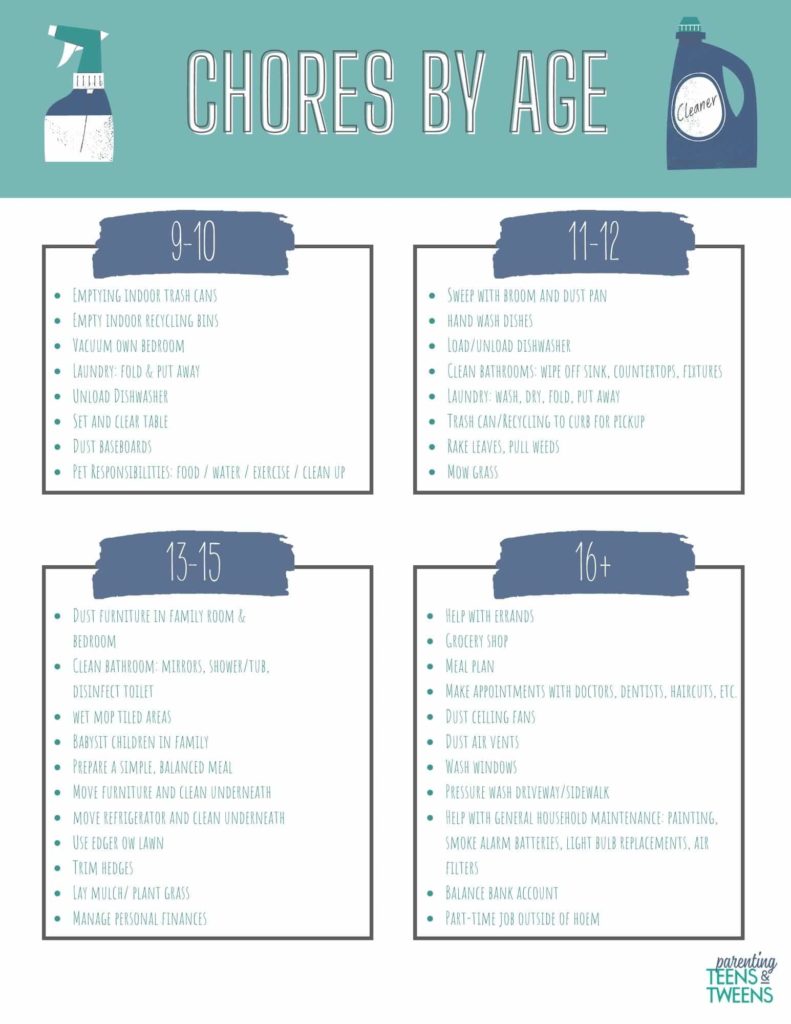Inside: There are some basic life skills that all teens needs to succeed as they become young adults. Chores can be a great way to help them learn some of those life skills and then others you will need to teach them. Here are 10 of the most important life skills you want your tween and teen to be working on in middle and high school. Free printable teen chore chart included.

Believe it or not, wherever you are in the tween or teen years, in just a blink you will be sending this young person out into the world of adulthood. Some of you may be feeling ready for that to happen sooner rather than later, but whether you are counting the moments or wishing they would slow down, as parents we have a responsibility to make sure they are ready when the time comes and a big part of that is making sure our tweens and teens are learning important life skills and doing age appropriate chores.
Part of helping our tweens and teens grow into the confident and capable young adults we know they can be is making sure they have the skills that are not only necessary to do well in school, but in life. Sometimes with academics and other activities it can be all too easy to let those important basic life skills go untaught. But your sons and daughters will thank you one day when they finally gain their independence and actually know how to take care of themselves and function in the adult world.
So below you find a list of teen chores and life skills that your teen will need to survive once they are on their own.
Ten Important Teen Life Skills They Need To Master In Order To Thrive In Adulthood (And Chores They Should Be Doing).
Manage Technology
Technology is already a huge part of your teen’s life and teaching teens to use technology appropriately is our responsibility. Chances are, your son or daughter doesn’t need lessons in how their phone or tablet operates but they do need boundaries and safety instruction. You’d never hand the keys of a Ferrari to an unlicensed 12 year old but there’s just as much danger in handing over unmonitored access to technology.
Your adolescent may have been playing on the family computer or iPad for years, but often that involves far more parental involvement. As they get older, freedom of access to technology usually comes through cell phones. So, the first, and most important thing you need to ask yourself is if your child is ready for a cell phone? Some kids in middle school really aren’t ready yet and don’t feel pressured to give them one just because “everyone has one but me.”
If you do move forward, have your child sign a cell phone contract. We’ve got a printable one that covers the basics for you Cell Phone Contract for Tweens and Teens. This sets expectations and shifts responsibility from you to them. It’s an important step in developing accountability.
Lastly, while some children are given access to social media in middle school, before you make your decision please read our post about How to protect your teen’s self esteem from social media threats Most social networks require or suggest a child be a minimum of 13 years old before joining. Ask yourself what kind of message are you sending if you allow them to get an account and bypass these rules (you are essentially telling them it is okay to lie since that is what you are doing to get them an account). In many cases, the benefits of social media aren’t always worth the potential costs, especially to younger teens.
Laundry
In our home when one of our kids starts middle school, they get their very own laundry basket! YEAH! Up until this point, they’ve had to help with doing laundry, such as folding and putting it away, but now they take on total ownership of doing their own laundry start to finish.
This means, if they have a practice or game coming up, they need to keep track of whether or not they’ve got a clean uniform and if not, time to do some laundry. Also, same goes for school uniforms. This puts them in charge of having to stay on top of making sure they’ve got the proper clothes ready for each day.
It’s not a bad idea if you walk them through how to use the laundry machines a few times, along with proper use of detergent, fabric softener and don’t forget cleaning out the lint basket. You could even write it down for them on a whiteboard on the laundry room door or have them put a note in their phones. Whatever works!
Make Bed/Change Sheets
And since you’re starting them on doing their own laundry, doing their own sheets should follow pretty soon afterwards. I’ve heard from more than one parent that their Freshman college student is at a loss when it comes to knowing how often to wash their dorm bed sheets much less how to remake the bed afterwards. Middle school or early high school is a great time to start this skill so it’s pretty much habit by college.
Now that they’ve learned to do their own laundry, sheets can absolutely be a part of this new chore. General guidelines suggest sheets be washed every one to two weeks. Much of this is personal preference, so go ahead and have them follow your wash schedule on this one. But make sure they know that if they’re sick, bedding should be washed as soon as they’ve recovered to prevent germs from spreading or re-infection.
Help them with the basics of making their bed the first few times and realize that they’re probably not going to care about hospital corners. After that, they’re on their own. Also, top sheets and their value have become a big point of debate for Gen Z. It’s up to you if you want to fight this battle or not.
Wake Up On Their Own
It wouldn’t be surprising if you’ve been functioning as your tween or teens alarm clock but learning to wake up on your one’s own is a definite skill, especially if you’re not raising a morning person. The day will come when you won’t be there to make sure they’re not snoozing through their morning math class or late for work.
This is why figuring out what time they need to get out of bed so they can get ready and leave at a designated time is a good life lesson to start in the teen years. It also helps them to realize the importance of sleep and how much easier it is to get going in the morning when you’ve gotten enough z’s. Tweens really need about 9 hours each night to be fully rested.
Resist the temptation to save them from the consequences of not getting them up on their own. If they sleep through their alarm it could simply mean having to go to school without their hair done or having to miss breakfast or it might mean being tardy and a detention. Either way, it drives home the importance of being on time and will help them develop their internal motivation to mastering this skill.
Pump Gas
You’re probably so in the habit of doing this that it may not have have occurred to you to teach this, but there’s no time like the present! This simple task is perfect for your tween and gives you a few minutes to jam out to your favorite songs while he or she dealing with the gas pump.
It’s also a quickie personal finance lesson. There is a good chance your kid has no idea how much gas costs or how often you need to fill-up. As they are getting ever closer to the day when they will behind the wheel of a car, making them aware of these details is a good starting point.
Keep a Calendar
Time management isn’t usually something that comes naturally to tweens and teens (or many adults for that matter). It really is a skill that one learns and it takes practice. Having your tweens and teens take responsibility for what time practices/games start, social events, appointments or school project deadlines as early is possible will serve them well as they move towards independence and adulthood.
You could start with a large white board or family calendar in a central part of home so it was easier to keep track for everyone. After they’ve shown they can handle that successfully, then switch them to an individual planner or find a digital system that suits your tween or teens needs.
Here are several popular planners for tweens and teens:
Cook Simple Meals
Breakfast and snacks are a great place to begin this training. Whether it’s frying eggs or an after school grilled cheese, using the stove top will help your teen son or daughter work up to more involved cooking. Other easy recipes to conquer include spaghetti, mac & cheese, tacos or quesadillas. Having teens bake boxed brownies or cakes is also a good way to introduce the basics of following a recipe, measuring, and general baking skills.
Stay as hands off as possible when your teens are cooking, even if they are making a mess. Remember, learning how to cook is something everyone should know and may even spark an interest in more involved culinary skills. Oh, and about that mess, don’t forget to let them know they’re responsible for clean up, too!
Want a little inspiration to help your teens learn how to cook? There are several great teen cookbooks you can check out:
The Complete Cookbook for Young Chefs
Handshake/Eye Contact
We’re going to assume that your tween or teen has basic manners and the etiquette of “please” and “thank you” down by now. However, because teens today spend way more time with screens and virtual interactions than you and I did while growing up, many are lacking some essential social skills.
In the recent article, 13 Things About Manners Gen-Xers Know That Their Kids Won’t, the importance of eye contact and a solid handshake are singled out as an issue for today’s young people. In the article it states, “Children today do not learn to shake hands while looking the other person in the eye. Glued to their devices, (they) are allowed to be isolated while still amidst other people. But a good handshake is the beginning of a relationship—you don’t want to botch that initial greeting.”
Eye contact isn’t just important when shaking someone’s hand. We can help our tweens and teens in this area by encouraging them to look us, as well as their siblings, in the eye when talking. Also, when you are dining out, whether ordering from the counter or sitting down at a table, let your teen tell the server what they would like to eat and make sure they look the person in the eye while doing it.
Basic Teen Hygiene Habits
If you have a tween or teen, you’ll know that this is not intuitive. Tweens and teens, particularly boys (sorry not sorry), are fairly noseblind to their own personal odors and often unconcerned with personal appearance. While this may improve as they get into the later high school years (sometimes sooner), there are some adolescent boys and girls who are just never going to care that much.
However, it doesn’t mean that they should be able to skip at least the basics of personal hygiene. Applying deodorant, brushing hair, managing oral hygiene(especially if braces become a factor) and teaching good skin care are areas that need to be addressed. You may have to nag, I mean remind, them often at first. But eventually it should become habit.
Basic Teen Chores
A few tween and teen chores have been covered already, but having regular and varied chores that your tween or teen is responsible for can really help them build life skills they will need as they move closer to independence. If you haven’t had your tween or teen responsible for doing chores, now is the time to start.
Being a contributing member of their family is good for tweens and teens. It gives them a chance to learn responsibility and also to develop a work ethic. Many studies show that kids who do chores are often more confident, feel closer to their families and even do better in school. So don’t feel bad making them take out the trash. It’s good for them!
In case you’re not sure what chores are right at which ages, you can get our FREE teen chore chart just for signing up to receive our weekly newsletters. Totally a great deal since our newsletters are a great way to get more tips and support for parenting teens and tweens. But, if the newsletter isn’t for you, you can always unsubscribe anytime!

Raising our tweens and teens to become responsible accountable adults isn’t easy. However, making sure they’ve got these 10 tween and teen chores/life skills mastered by the time they graduate high school will definitely have them set up for success. It may take a little time and definitely some patience, but they’ll get there and once they do it will actually make your life easier. Plus, it may be cliche, but they really will thank you one day for making sure they know how to take care of themselves.
P.S. re you looking to have a better relationship with your teen? We love this book, Parenting Teens with Love and Logic: Preparing Adolescents for Responsible Adulthood, by Jim Fay.

When you are in the thick of raising teens and tweens, we recommend Loving Hard When They’re Hard to Love by Whitney Fleming. In Loving Hard When They’re Hard to Love, blogger Whitney Fleming shares her favorite essays about raising three teenagers in today’s chaotic world. Written from the perspective of a fellow parent, each story will leave you with tears in your eyes and hope in your heart because someone else is saying exactly what’s been going through your mind.

Parenting teens and tweens is hard, but these popular posts that other parents found helpful just might make it a little easier.
50 Simple and Useful Life Skills for Teens You Can Teach Quickly
9 Essential Soft Skills Every Teen Needs to Succeed in Today’s World
Part Time Jobs for Teens To Help Them Learn To Adult
* This post contains affiliate links where we earn a small commission for sales made from our website.







How to print information / how to get to the links in blue